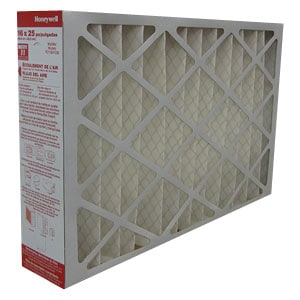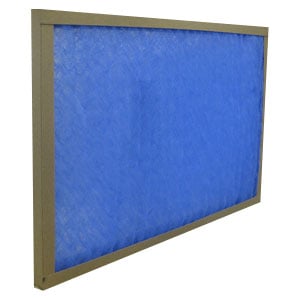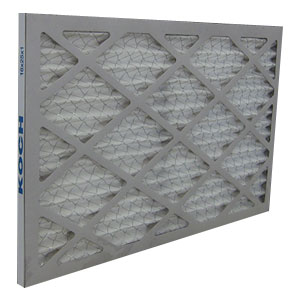Filters
Most people are familiar with a standard blue fiberglass filter. What most are unaware of is that standard filters are mainly there to protect your heating and cooling equipment. A standard filter is not designed for optimal home air quality. They do filter particulate matter, just not as well as they should. Allowing dust and particulates to be deposited onto the furnace blower, heat exchanger and air conditioning coil will reduce the efficiency and the comfort capabilities of your HVAC system.
Media

The ideal filter for a tidy home. Media filters are capable of removing 99.9 percent of particles of pollen, mold and spores. Also, removing other asthma irritants such as dust, dust mite debris and pet dander. Bacteria and virus sized particulates can also be captured.
Media filters have a larger surface area. They are not only great at catching particulate matter but they also allow less restrictive airflow. Having a higher MERV filter with a larger surface area means cleaner air in your home, a longer time before replacing your filter and a longer life for your HVAC system.
Pleated
A step above fiberglass, pleated filters offer much better removal of particulates from the air. In most HVAC systems these filters will add some restriction to the air flow. As they are better at catching dust and debris; they will need to be replaced more often than a standard fiberglass filter.
Fiberglass

As stated above, these filters have almost nothing to do with air quality. They are important to have to ensure the equipment does not get blocked with debris, though they will allow some through.
Filter Replacement
When your filter gets dirty your heating and cooling system pressure begins to increase. That added pressure puts more strain on your system and may lead to a shortened lifespan. Along with decreased airflow which means decreased comfort in your home. Regular filter replacement with annual maintenance helps ensure the cleanest and safest air for your home or business.
While having a higher MERV rating is obviously beneficial, a 1″ filter with a higher MERV will need to be changed more regularly to provide proper airflow to your system. A 4″ media filter can be changed once every 6 months to a year depending on home conditions.
Continuously clean the air in your home by running your furnace blower. To increase the efficiency of your furnace blower motor, we suggest having a variable speed motor installed.
MERV
Filters are rated in what is called MERV. Standing for Minimum Efficiency Reporting Value, MERV is a performance rating scale. A higher MERV rating will deliver better results. Typically found in a range of 2 for a basic fiberglass filter, through 16 for maximum filtering potential. If you are currently using a fiberglass filter you will want to consider upgrading.

